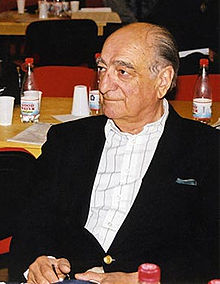Myron Tribus
American engineer and organizational theorist (1921–2016)
Myron T. Tribus (born October 30, 1921) is an American organizational theorist, who was the director of the Center for Advanced Engineering Study at MIT from 1974 to 1986. He is known as leading supporter and interpreter of W. Edwards Deming, for popularizing the Bayesian methods, and for coining the term "thermoeconomics".

| This article about an engineer, inventor or industrial designer is a stub. You can help out with Wikiquote by expanding it! |
Quotes
edit- You can manage what you do not understand, but you cannot lead it.
- Myron Tribus quoted in: Henry R. Neave, "Deming'88* Part 2: The 14 Points revisited (Points 1–7)." Total Quality Management 1.2 (1990): 169-182.
- If you try to improve the performance of a system of people, machines, and procedures by setting numerical goals for the improvement of individual parts of the system, the system will defeat your efforts and you will pay a price where you least expect it.
- Myron Tribus, Quality First, Washington, D.C.: National Society of Professional Engineers (#1459), 1992
- The great quality teacher, Shoji Shiba, often tells people that the biggest barrier to changing understanding is the following word: IAKI, which is not a Japanese word at all. It is an acronym for I ALREADY KNOW IT... Professor Shiba then goes on to say: “Yes, you may know it, but you don't know how to do it!” There is an enormous difference between knowledge and know-how... Too many executives believe that if they listen to a lecture or read a book they will know how to do something....Nobody ever became a great lover by just reading a book or watching a video. You have to get in and do it. There are some things you can only learn through experience.
- Myron Tribus "You Cannot Lead What You Do Not Understand — You Do Not Understand What You Haven't Done". Journal of Innovative Management, Fall 1996; As quoted in: William J. Altier (1999) The Thinking Manager's Toolbox. p. 9
- Tomas Bata and Bata-System of management are not well known today even though their success and heritage value are undisputed and awe-inspiring in the New Economy. T. Bata died in 1932 in a plane crash. By the time of his death he had introduced fundamental changes in management philosophy and techniques. Many of Bata approaches have been ‘discovered’ during the last 20 years by the Western World as part of what has become known as the ‘Quality Revolution’. Quality management was practiced by the Bata enterprises since before the World War I, through 1920s, 1930s and 1940s, well before the ‘gurus of quality’ even started thinking about the subject. Japanese visitors came to Zlin to learn about the Bata system well before the World War II. In addition, Bata executives traveled to Japan in 1937 and predicted the industrial rise of Japan at that time.
- Myron Tribus (2000), cited in: Fisher, N. I., and V. N. Nair. "Quality management and quality practice: Perspectives on their history and their future." Applied Stochastic Models in Business and Industry 25.1 (2009): 1-28.